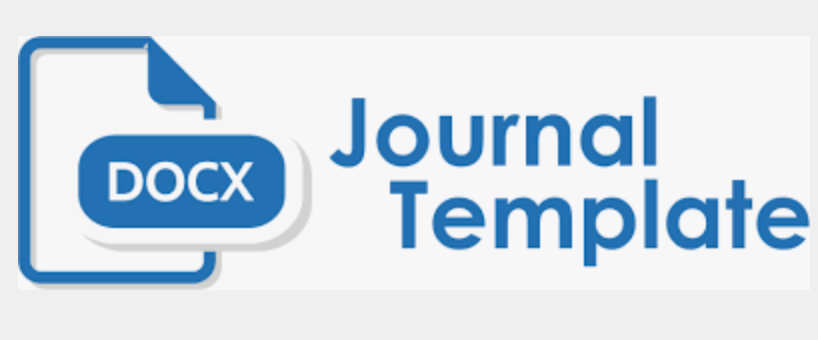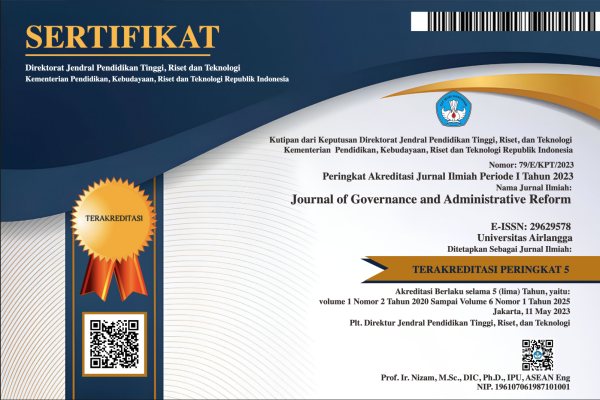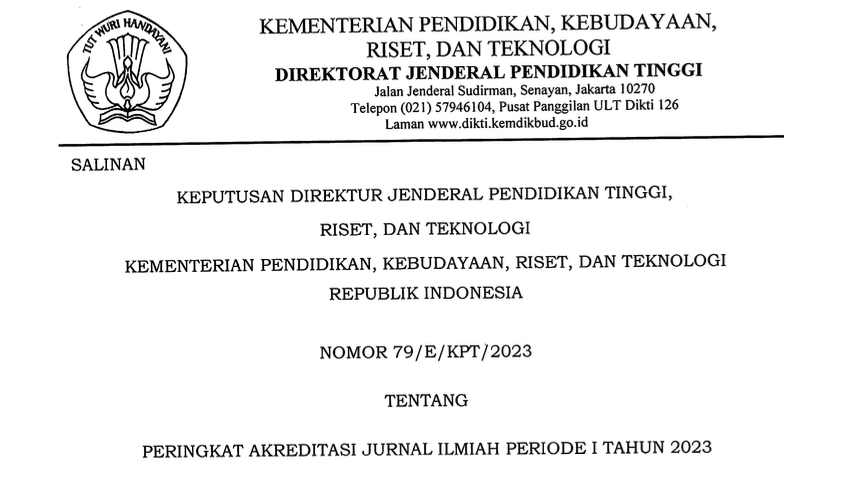Dynamics of Interaction and Collaboration Between Actors in Formulating Corporate Social Responsibility Policies: A Case Study of Regional Regulations of East Java Province
Downloads
Abstract
The study and implementation of public policy mechanisms, whether conducted by academics, political actors, or public officials, inevitably encounter complex challenges. In particular, the process of public policy formulation often involves competing interests among the actors affected by these policies. This article examines the mechanisms, roles, and interaction patterns among actors involved in the formulation of East Java Provincial Regulation Number 4 of 2011 on Corporate Social Responsibility (CSR). Using a descriptive qualitative approach, this study explores two types of interaction models: associative and dissociative. The findings reveal that the interaction model in the policy formulation process is inherently dynamic, with variations in how the interests of each actor are aligned. Dissociative interactions often transform into associative ones when the interests of the actors converge. The formulation of the CSR Regional Regulation in East Java follows a group model characterized by a non-decision-making interaction pattern. The interaction among actors aims to accommodate various interests, including those of local governments, politicians, entrepreneurs, and the community. This collaborative process reflects the importance of cooperation and interest accommodation for effective and sustainable policies. This research provides an in-depth understanding of the dynamics of interaction and collaboration among actors in the CSR policy formulation process and offers valuable references for similar policy formulation studies in other regions.
Keywords: public policy, policy formulation, interaction, collaboration
Abstrak
Dalam proses mempelajari atau mengimplementasikan mekanisme kebijakan publik, baik yang dilakukan oleh para akademisi, aktor politik, atau oleh para pejabat publik, pastinya akan mengalami tantangan yang kompleks. Terutama, dalam proses formulasi kebijakan publik terdapat berbagai persaingan kepentingan di antara para aktror yang akan menjadi objek kebijakan tersebut. Artikel ini akan membicarakan mekanisme dan peran para aktor sekaligus pola interaksi antar aktor dalam formulasi Perda Provinsi Jawa Timur nomor 4 tahun 2011 tentang Tanggungjawab Sosial Perusahaan. Penelitian ini akan menggunakan deskriptif kualitatif untuk memahami bagi dua jenis model interaksi yang terjadi, asosiatif dan disosiatif. Hasil penelitian menunjukkan bahwa model interaksi yang dipergunakan dalam proses formulasi kebijakan juga tidak selalu stabil, sehingga akan selalu berbeda-beda tergabung bagaimana kepentingan masing-masing aktor. Interaksi disosiatif, terkadang berubah menjadi asosiatif ketika kepentingan aktor aktornya tersebut sudah terpenuhi. Formulasi kebijakan Perda tentang Tanggungjawab Sosial Perusahaan di Jawa Timur dilakukan melalui model kelompok dengan pola interaksi non-decison making. Interaksi antar aktor merupakan upaya untuk mengakomodasi berbagai kepentingan yaitu kepentingan pemerintah daerah, politisi, pengusaha, dan masyarakat. Proses interaksi tersebut memperlihatkan adanya kerja sama dan akomodasi kepentingan, yang merupakan dua hal penting bagi efektifitas dan keberlanjutan kebijakan. Oleh sebab itu, penelitian ini menghasilkan pemahaman yang mendalam mengenai dinamika interaksi dan kolaborasi antar aktor dalam proses formulasi kebijakan Tanggungjawab Sosial Perusahaan, dan dapat memperoleh referensi bagi studi lebih lanjut dalam konteks formulasi kebijakan serupa di daerah lain.
Kata kunci: kebijakan publik, formulasi kebijakan, interaksi, kolaborasi.
Achda, T. B. (2006). Konteks Sosiologis dan Perkembangan Corporate Social Responsibilities dan Implementasinya di Indonesia. Disampaikan pada Seminar Nasional: A Promise of Gold Rating: Sustainable CSR, 23 Agustus 2006, hlm. 78.
Austin, J. E., & Seitanidi, M. M. (2012). Collaborative Value Creation: A Review of Partnering between Nonprofits and Businesses: Part 1. Value Creation Spectrum and Collaboration Stages. Nonprofit and Voluntary Sector Quarterly, 41(5), 726-758.
BAPPEDA Jatim. (2010). Laporan Penelitian tentang Program Kemitraan dan Bina Lingkungan (PKBL) di Jawa Timur, hlm. 45-55.
Breugel, L. (2013). Community-based tourism: Local participation and perceived impacts A comparative study between two communities in Thailand. Master Thesis Faculty of Social Sciences. Radboud University Nijmegen. Halaman 45-55.
Carroll, A. B. (1999). Corporate Social Responsibility: Evolution of a Definitional Construct. Business & Society, 38(3), 268-295.
Chang, H. J. (2014). Collaborative Governance in Welfare Service Delivery: Focusing on Local Welfare System in Korea. International Review of Public Administration, 13(1), 75–90.
Doberstein, C. (2016). Designing Collaborative Governance Decision-Making in Search of a Collaborative Advantage. Public Management Review, 18(6), 819–841.
Howlett, M., Ramesh, M., & Perl, A. (2009). Studying Public Policy: Policy Cycles and Policy Subsystems. Oxford University Press, hlm. 56, 59-63, 66.
Matten, D., & Moon, J. (2008). “Implicit” and “Explicit” CSR: A Conceptual Framework for a Comparative Understanding of Corporate Social Responsibility. Academy of Management Review, 33(2), 404-424.
McWilliams, A., & Siegel, D. (2001). Corporate Social Responsibility: A Theory of the Firm Perspective. Academy of Management Review, 26(1), 117-127.
Moleong, J. L. (2007). Metode Penelitian Kualitatif. Bandung: PT. Remaja Rosdakarya, hlm. 102.
Porter, M. E., & Kramer, M. R. (2006). Strategy and Society: The Link Between Competitive Advantage and Corporate Social Responsibility. Harvard Business Review, 84(12), 78-92.
Solihin, I. (2009). Corporate Social Responsibility: From Charity to Sustainability. Jakarta: Salemba Empat.
Susiloadi, P. (2008). Implementasi Corporate Social Responsibility. Spirit Publik, 4 (2), 123-130.
Wahyudi, I., & Azheri, B. (2011). Corporate Social Responsibility dalam Perspektif Hukum dan Implementasinya di Indonesia. PT RajaGrafindo Persada. Halaman 88-98.
Copyright (c) 2024 Authors

This work is licensed under a Creative Commons Attribution-ShareAlike 4.0 International License.
Jurnal Governance and Administrative Reform by Unair is licensed under a Creative Commons Attribution-ShareAlike 4.0 International License.
1. The journal allows the author to hold the copyright of the article without restrictions.
2. The journal allows the author(s) to retain publishing rights without restrictions
3. The legal formal aspect of journal publication accessibility refers to Creative Commons Attribution Share-Alike (CC BY-SA).






















